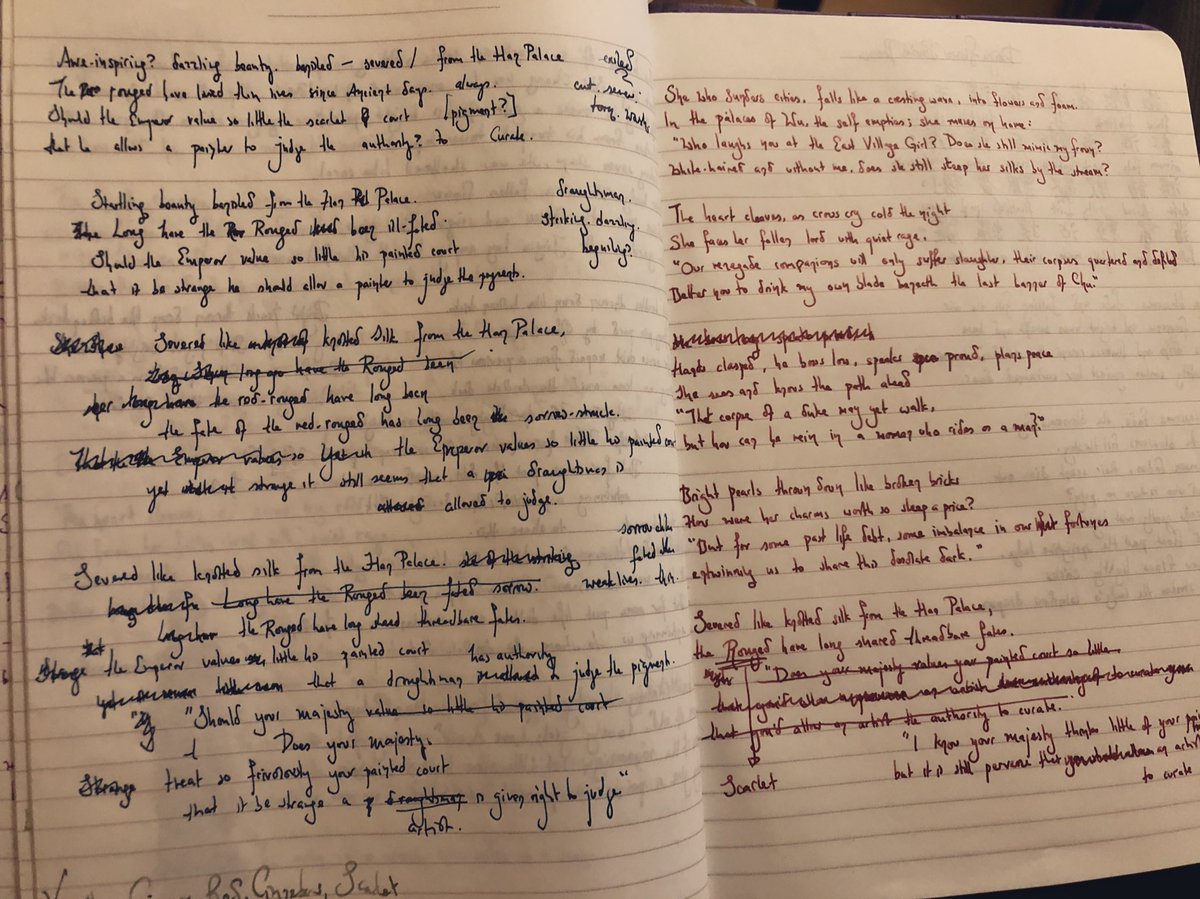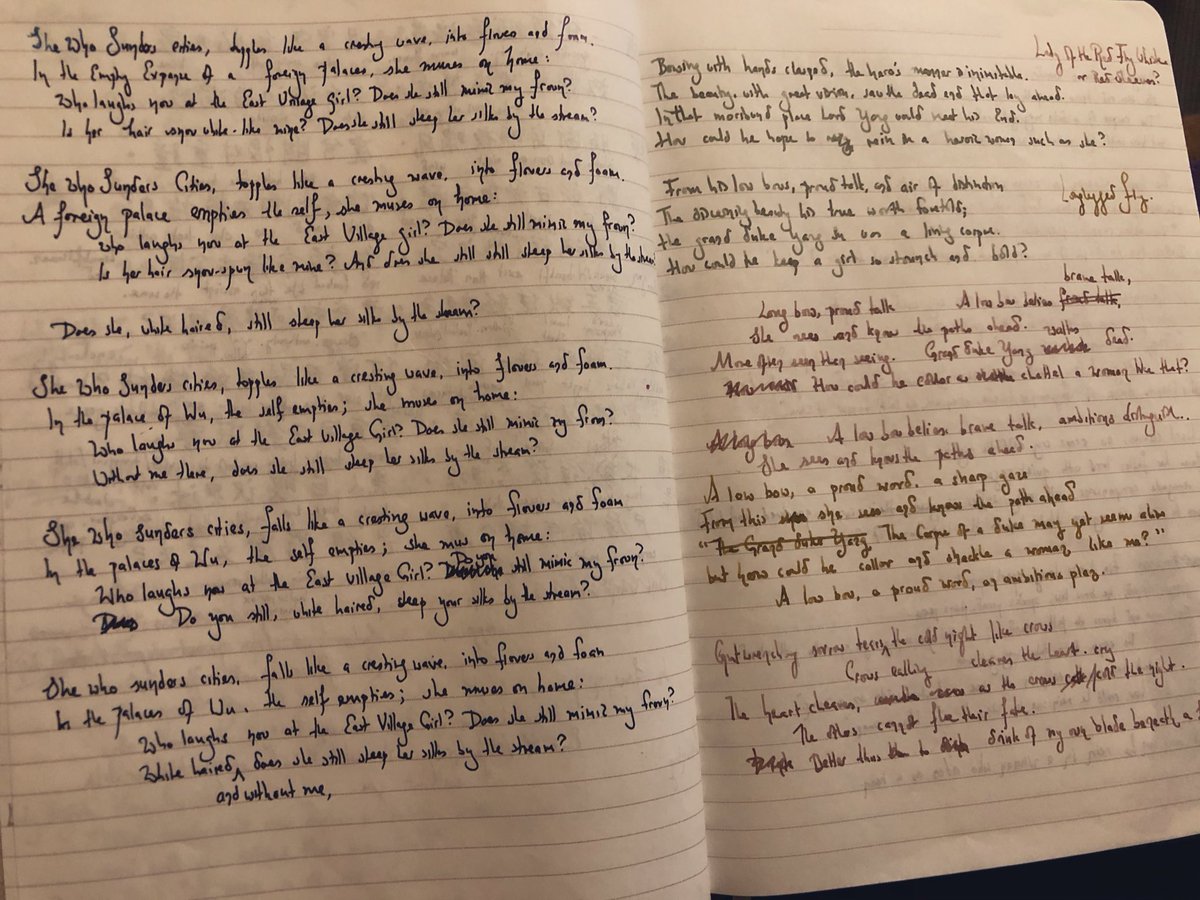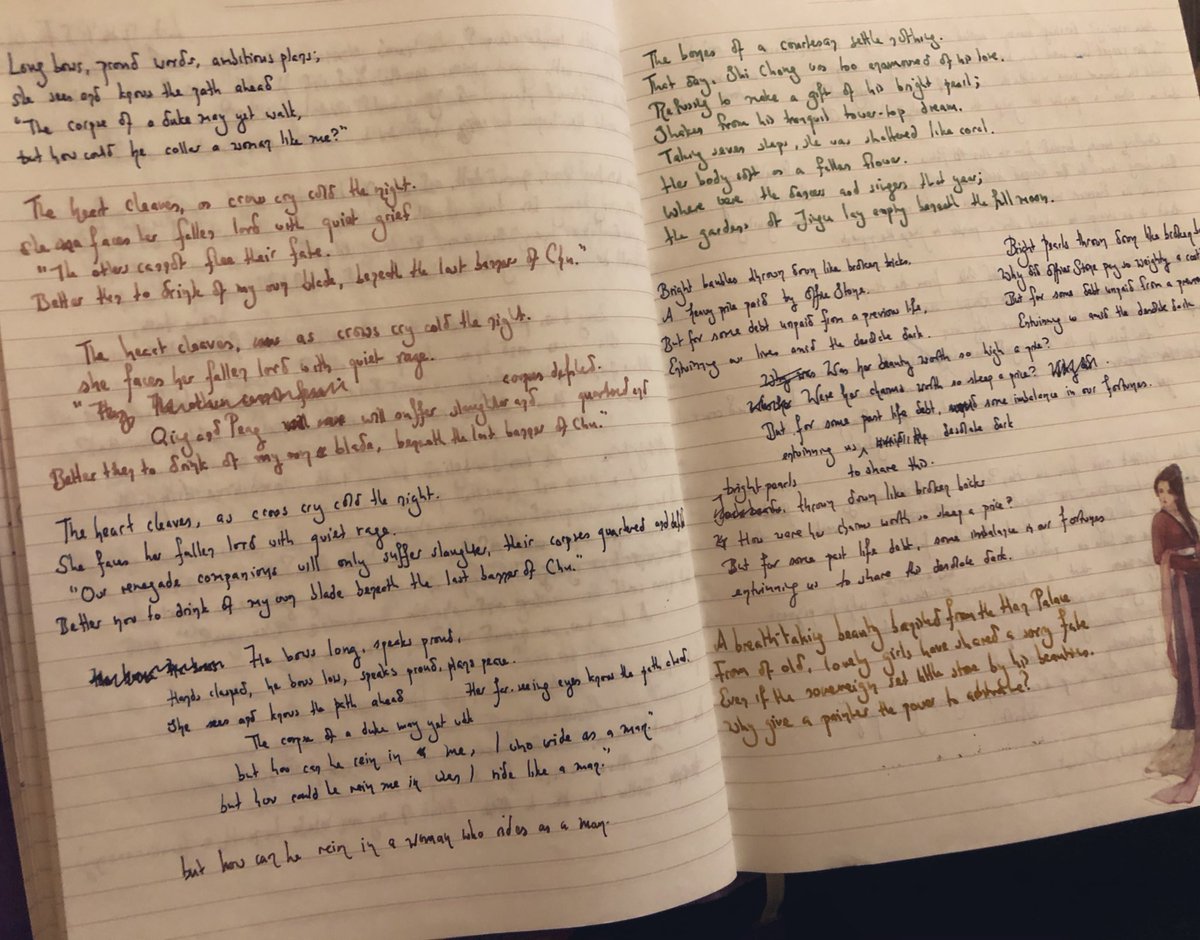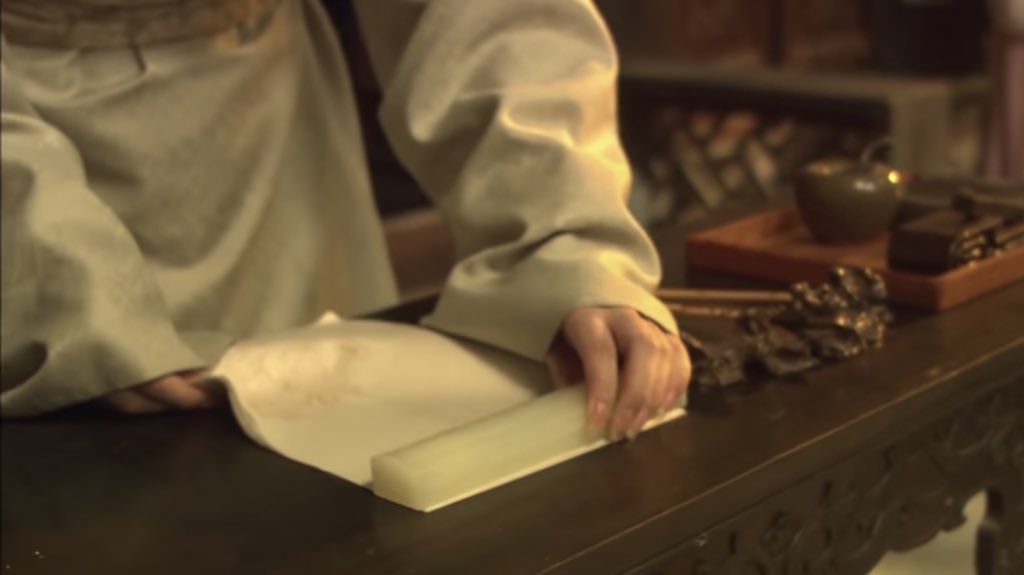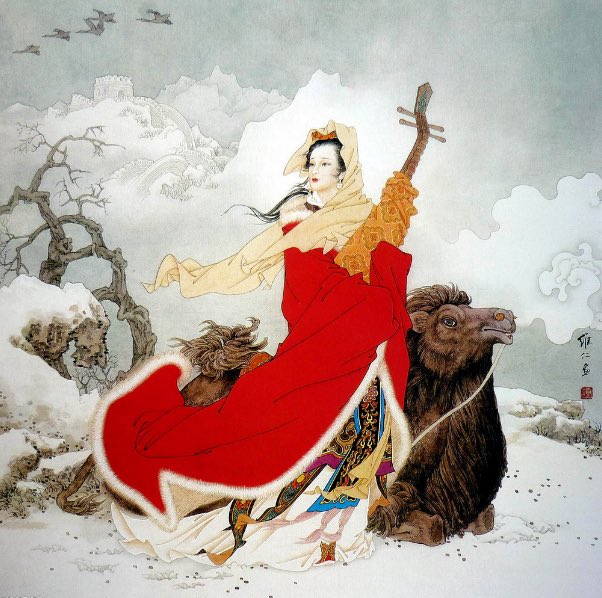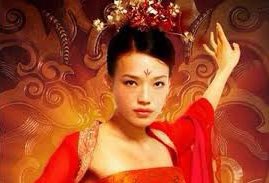I've been reading 紅樓夢 (Dream of Red Mansion, aka Story of the Stone) and on a whim have translated the poems Daiyu writes in chapter 64.
Here is a thread of my efforts as well as my through my process behind my translation:
Here is a thread of my efforts as well as my through my process behind my translation:
西施
She who sunders cities, falls like a cresting wave, into flowers &foam
In the palaces of Wu, the self empties; she muses on home:
"Who laughs now at the East Village Girl? Does she still mimic my frown?
White-haired &without me, does she still steep her silks by the stream?"
She who sunders cities, falls like a cresting wave, into flowers &foam
In the palaces of Wu, the self empties; she muses on home:
"Who laughs now at the East Village Girl? Does she still mimic my frown?
White-haired &without me, does she still steep her silks by the stream?"
虞姬
The heart cleaves, as crows cry cold the night.
She faces her fallen lord with quiet rage:
"Our renegade companions will only suffer slaughter, their corpses quartered and defiled;
Better now to drink my own blade beneath the last banner of Chu."
The heart cleaves, as crows cry cold the night.
She faces her fallen lord with quiet rage:
"Our renegade companions will only suffer slaughter, their corpses quartered and defiled;
Better now to drink my own blade beneath the last banner of Chu."
明妃
Severed like knotted silk from the Han Palace,
The rouged and the dyed have long shared threadbare fates.
"I know your majesty thinks little of your painted court,
But it is still perverse that an artist should have authority to curate us."
Severed like knotted silk from the Han Palace,
The rouged and the dyed have long shared threadbare fates.
"I know your majesty thinks little of your painted court,
But it is still perverse that an artist should have authority to curate us."
緣珠
Bright pearls thrown down like broken bricks,
How were your charms worth so steep a price?
"It is just a past life debt, an imbalance in our fortunes,
That entwines us to share this desolate dark."
Bright pearls thrown down like broken bricks,
How were your charms worth so steep a price?
"It is just a past life debt, an imbalance in our fortunes,
That entwines us to share this desolate dark."
紅拂
Hands clasped, he bows long and low; he speaks proud, plans peace.
She sees and knows the path ahead,
"That corpse of a duke may yet walk,
But even he cannot rein in a woman who rides like a man."
Hands clasped, he bows long and low; he speaks proud, plans peace.
She sees and knows the path ahead,
"That corpse of a duke may yet walk,
But even he cannot rein in a woman who rides like a man."
So some context first from the novel.
Daiyu (aka “the pastel goth”) has been reading some biographies of tragic women and has, predictably, written some poems about them.
(I’ve kept the original titles because it’ll be easier for someone to google their names that way.)
Daiyu (aka “the pastel goth”) has been reading some biographies of tragic women and has, predictably, written some poems about them.
(I’ve kept the original titles because it’ll be easier for someone to google their names that way.)
Like all my translations, these are loose. There are better and more literal translations out there if you’re wanting to quote it in your next academic essay.
I do this for fun and post them so that I can have a mental “end point” instead of tinkering them forever.
I do this for fun and post them so that I can have a mental “end point” instead of tinkering them forever.
I’ve framed the last two lines of each of the poems as a quotation from the woman they are about. This is not really in the original. I got the idea from Hawkes who did it for one of the set (Yuji).
But I like the idea of hearing them speak & it gives the poem cycle some unity.
But I like the idea of hearing them speak & it gives the poem cycle some unity.
In general, I’ve tried to lean into the imagery that’s used in the poems and elaborate on them rather than add any explanatory narrative of who they are. I wanted to build an image. Mostly because it’s how I enjoy them, that striking image that echoes after reading.
It also feels vaguely in keeping with the prophetic poems (though admittedly of a very different style and narrative purpose) in the famous chapter five, where the fates of various female characters are summarised and foreshadowed. It’s all motifs and symbols.
Anyway, XiShi. Famous for being one of the four most beautiful women in Chinese history. Her beauty was weaponised by her country (Yue) as she was recruited to become the concubine of the Tyrant of Wu and with her womanly wiles, bring down his growing empire. She did. https://twitter.com/jeannette_ng/status/1347207301728505864
Xi Shi’s name means “Shi from the West”. She has a weak heart and hence frowns a lot in pain, clutching at her chest.
As the story goes, there was an unattractive woman by the same name living in the East Village (Dong Shi) who mimics Xi Shi’s frowning and heart-clutching.
As the story goes, there was an unattractive woman by the same name living in the East Village (Dong Shi) who mimics Xi Shi’s frowning and heart-clutching.
This scrap of folklore is the basis of the saying “Dong Shi Frowns”, referring to someone mimicking superficial or irrelevant aspects of someone else’s success. It is indeed lowkey misogynistic in the whole “wanting to be more beautiful” bullshit.
Here in this poem, I’ve leaned into the idea of Dong Shi (“east village girl”) as a sort of poetic double. Someone who Xi Shi could have been and the idea that their lives were mirrored until they diverged. That sense of nostalgia. Did life just go on the same without me there?
Almost every translation explicitly spells out the beauty part of 倾城 (literally, destroy city)
So it’d be translated “kingdom-quelling beauty” (Hawkes) or similar. It irks me that it needs to be explicit that she’s hot. She broke a city already, it does need spelling out.
So it’d be translated “kingdom-quelling beauty” (Hawkes) or similar. It irks me that it needs to be explicit that she’s hot. She broke a city already, it does need spelling out.
After all, Helen of Troy launched a thousand ships and burnt the topless towers of ilium. She’s not “the BEAUTY” who does that. She just does. And you know.
So I went for “She Who Sunders Cities” and left it unspoken.
So I went for “She Who Sunders Cities” and left it unspoken.
As a bonus for anyone who remembers the Beast Below live role play game, that is indeed how we rendered the names of demons. It’s a silly thing that only means anything to like five people but it amuses me and is part of my own private lexicon.
The original just has basically “break into waves and flowers” but I really wanted to tease out the image of the toppling wave and the flower-like sea foam. So my first line becomes this ungainly mess. This won’t be the last time I do this.
So, Yu Ji, aka the Consort Yu.
She was the wife of the King of Chu, who lost to Liu Bei (founder of the Han Dynasty). In Chinese literature, the last stand of Chu is this big poetic, inevitable defeat.
Yu Ji is famous for killing herself on the eve of the last battle. https://twitter.com/jeannette_ng/status/1347207462663954434
She was the wife of the King of Chu, who lost to Liu Bei (founder of the Han Dynasty). In Chinese literature, the last stand of Chu is this big poetic, inevitable defeat.
Yu Ji is famous for killing herself on the eve of the last battle. https://twitter.com/jeannette_ng/status/1347207462663954434
Yu Ji as a tragic figure, loyal to the last, fearless in her self-destruction shows up a lot in Chinese literature. These five women are not obscure references. This whole poem cycle is like writing one about Helen of Troy, Hypatia of Alexandria, etc.
But as Baochai says, there needs to be a twist. In some ways, their conversation commenting on the poems Daiyu writes guides my translation. The idea that you need a twist, something new to bring to the already tired ink-flooded conversation.
“The heart cleaves, as crows cry cold the night”
I went FULL GOTH for this line and I’m a little proud of it. The original could probably be more accurately rendered “gut-wrenching”, but heart is just more... melodramatic.
I rendered 恨 as “rage”, others have gone for “despair”
I went FULL GOTH for this line and I’m a little proud of it. The original could probably be more accurately rendered “gut-wrenching”, but heart is just more... melodramatic.
I rendered 恨 as “rage”, others have gone for “despair”
As is probably obvious, the poem is set at the end of her life and this is where her husband is about to be defeated in battle and we see her last words.
It is “drink” the sword in the original. Its striking an image so I kept it over making it “taste of own’s own steel” or “fall on your own sword”.
I hope the unusual phrasing make it just that little bit gorier and surprising, less ritualised and normal.
I hope the unusual phrasing make it just that little bit gorier and surprising, less ritualised and normal.
Lastly, it’s technically a Chu tent that she does this in. Hawkes for example, chooses to emphasise the “decent dark” of the tent. For a sense of privacy, I think, the choice not to be made a spectacle of. Yang (Foreign Languages Press) has it as “Chu tent”.
I wanted to emphasise the Chu aspect of it. The demise of their empire but also culture. Folk stories about this battle speak of how the Han side sung songs of Chu to make them nostalgic and give up hope as already conquered (and their people conscripted on the other side.)
And so the cloth tent gave way to becoming the last banner. I’m taking a lot of liberties, I know. Again, it’s the imagery for me. It’s more striking to me and emphasises the martial, as well as the idea that this is their last scrap of land.
Ming Fei, more commonly known as Wang Zhaojun.
She was the emperor’s concubine. She refused to bribe an artist to draw her more hot and for that he made her hideous, causing the emperor to marry her off to a barbarian horse lord (as the story goes). A decision he then regrets. https://twitter.com/jeannette_ng/status/1347207929422868481
She was the emperor’s concubine. She refused to bribe an artist to draw her more hot and for that he made her hideous, causing the emperor to marry her off to a barbarian horse lord (as the story goes). A decision he then regrets. https://twitter.com/jeannette_ng/status/1347207929422868481
Because, plot twist, she’s hot after all. (Sometimes, you get the impression that every woman who ever does anything in Chinese history is hot).
She’s almost always depicted in this red cloak with white trim, about to be “exiled” to the borderlands as a treaty bride.
She’s almost always depicted in this red cloak with white trim, about to be “exiled” to the borderlands as a treaty bride.
The artist who “curates” the women of the inner palace gains considerable notoriety in literature. Red Mansion has the characters quote another poem that goes “She is so impossibly hot that she can’t be rendered on paper properly, so we shouldn’t fault the artist for fucking up”
I’m not a fan of my own version of this. I put it off til the end. I find it clumsy and UGH. But what I did is try to lean into the rouge/red-dye imagery that goes on it in, threading it though each line. Which isn’t quite in the original but is there if you squint super hard.
Lüzhu, literally “Green Pearl”
Somewhat less famous than the others but still with her own wikipedia page. She was bought by Shi to be his concubine for strings of pearls, and famously he wouldn’t give her up when the Prince of Zhao came asking for her resulting in a massacre. https://twitter.com/jeannette_ng/status/1347208776336728071
Somewhat less famous than the others but still with her own wikipedia page. She was bought by Shi to be his concubine for strings of pearls, and famously he wouldn’t give her up when the Prince of Zhao came asking for her resulting in a massacre. https://twitter.com/jeannette_ng/status/1347208776336728071
I know, another incredibly hot woman who causes the downfall of society through her hotness and people fighting over her?!
Daiyu is a fictional poet, but it’s uncommon for real female poets to write rebuttals to this shit https://twitter.com/jeannette_ng/status/1106735135033044992
Daiyu is a fictional poet, but it’s uncommon for real female poets to write rebuttals to this shit https://twitter.com/jeannette_ng/status/1106735135033044992
The vagueness of the line “so steep a price” is intended for a double meaning, ie. Shi Chong does literally buy her for pearls, but he also “pays” in the sense that not giving her up means he and his family get massacred.
All five poems have obvious narrative/thematic parallels to Daiyu herself and the events within 紅樓夢. The Green Pearl poem even more so than the rest as of course, Daiyu is the incarnation of the Crimson Pearl Flower (绛珠仙草).
Shi Chong is surnamed Stone (石), creating parallels with the titular Stone (who Baoyu is an incarnation of). And obviously the poem is all about past life debts being paid and the entwining of fates. Which is, of course, a big theme in their rock/flower romance.
If I was translating this in situ of the novel, I might want to lean in harder on the parallels, because these poems are a sort of foreshadowing. Such that they seem to be describing of these historical women but also be describing Daiyu.
But I sort of more opted for the alternate route of leaning into them being angst goth poems that Daiyu the character would have written rather than the narrative function of them being foreshadowing. A better translator can maybe do both. I can’t.
Last one!
Hongfu, lit. “Red Flywhisk” (or maybe Sleeves)
She began as a courtesan in the court of Yang Su (a Sui minster). Li Jing came a plan to make peace/subdue evil warlords/etc and she just fell in love. They eloped and became folk heroes who establish the Tang dynasty. https://twitter.com/jeannette_ng/status/1347212517957914624
Hongfu, lit. “Red Flywhisk” (or maybe Sleeves)
She began as a courtesan in the court of Yang Su (a Sui minster). Li Jing came a plan to make peace/subdue evil warlords/etc and she just fell in love. They eloped and became folk heroes who establish the Tang dynasty. https://twitter.com/jeannette_ng/status/1347212517957914624
As one of Three Heroes of the Wind and Dust (along with Li Jing), she plays a role in one of the oldest wuxia stories (“Man with the Curly Dragon Beard”). And here she is being played by Shu Qi.
The poem is about that turning point in her life, when she sees clearly what needs to be done, and runs away with Li Jing. Instead of love at first sight, the poem frames her decision as foresight and wisdom. She knows.
This one is almost impenetrable without the backstory and footnotes but I didn’t think trying to incorporate more narrative would help. It’s just four lines. So behold, the twitter thread of footnotes.
This one also has a difference btwn GaoE and Red Inkstone manuscript versions
This one also has a difference btwn GaoE and Red Inkstone manuscript versions
GaoE has there be a long sword. The manuscript versions say it’s a long bow. I almost went for sword just because all other english translations I’d found went for the bow and I was wanting some variety, but as always, the manuscript has precedent.
And that’s it, I translated some poems. I hope they were mildly interesting amid everything else that is happening today.
I might attempt something else from Red Mansion next but who knows. I keep saying I’m going to do Book of Odes
I might attempt something else from Red Mansion next but who knows. I keep saying I’m going to do Book of Odes

 Read on Twitter
Read on Twitter